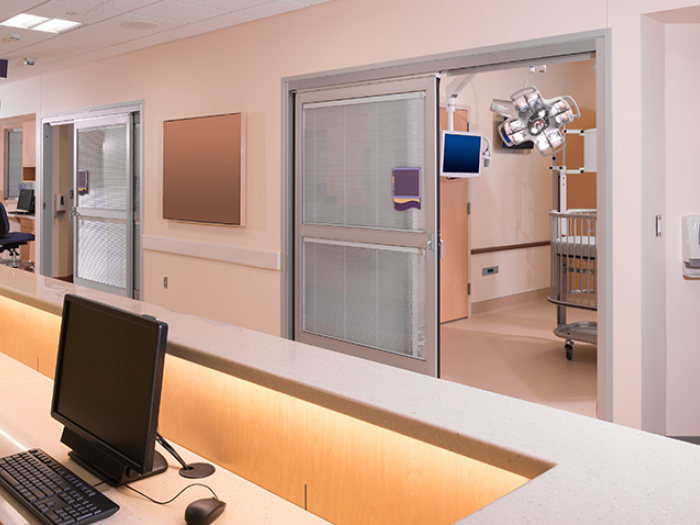Worse outcomes for patients living in areas with few primary care providers suggests need to boost efforts to increase training, geographic distribution
1:30 PM
Author |

America’s shortage of primary care doctors and nurse practitioners has a downstream effect in the nation’s operating rooms, a new study finds.
And patients suffer as a result.
In all, people living in areas with the most severe shortages of primary care providers have a much higher risk of having emergency surgery, rather than a scheduled operation, compared with people with the same condition who live in areas with less dire primary care shortages.
Those living in the areas with the lowest availability of primary care providers also have a higher chance of suffering complications after surgery, and needing to go back to the hospital after they’ve left it, according to the findings in the March issue of the journal Health Affairs from a team at Michigan Medicine, the University of Michigan’s academic medical center.
When timing matters
The team looked at data for people with traditional Medicare coverage who had operations for conditions where timing can really matter: colectomy to remove a cancerous area of the colon, repair of a hernia, and repair of aneurysms in wall of the aorta, the body’s largest blood vessel.
They focused only on people living in areas classified by the federal government as having a shortage of primary care providers. They then divided these areas into five levels of shortage.
In all, nearly 38% of the patients living in the more severe shortage areas had their operations on an emergency basis, compared with 30% of those living in the areas with the least severe shortages.
Those living in areas with more severe shortages also had a higher risk of serious complications from surgery (15% vs. nearly 12%), and those living in the most severe shortage areas also had a higher risk of readmission to the hospital (nearly 16% vs. 13.5%).
Rural area care
Lead author Sara Schaefer, M.D., said her experience growing up in Idaho and going to medical school at the University of Washington -- where she learned alongside primary care providers serving huge rural areas -- informed her interest in the topic. She is now a resident in the U-M Department of Surgery and a healthcare administration fellow at the Center for Healthcare Outcomes and Policy, and notes that she and her colleagues operate on many patients who travel from rural areas of Michigan, especially for emergency operations.
“The primary care provider shortage is a key piece in accessing care, because if you have no access to primary care, that impacts your access to specialists,” she said.
“A scheduled surgical case is always better than an emergency case in outcomes, costs and impact on the patient’s life, so the role of the primary care provider in identifying a potential issue, and referring a patient for diagnostic imaging and surgery, can make a major difference in addressing an urgent problem before it becomes an emergency.”
While she and her colleagues on the study – including surgery assistant professor Andrew Ibrahim, M.D., M.Sc. – did not find a difference in patients’ risk of death based on severity of primary care shortage, they did show that mortality risk was lower for those living in non-shortage areas compared with shortage areas.
Primary care supply
The results of the study, the authors say, should underscore the importance of efforts to increase the supply of primary care providers and to attract them to practice in underserved areas.
This includes both rural and urban primary care shortage areas; the study found that 58% of the census tracts classified as having a primary care shortage of any level were rural.
Loan forgiveness and restructuring programs, to alleviate the education related debt of physicians and other providers, are a key tool in this effort, Schaefer notes. Encouraging more providers to choose primary care careers, rather than specializing, and incentivizing them to practice in areas of shortage, could ultimately mean better outcomes when people living in those areas need time sensitive operations, even if they travel many miles to get to the operating room.
SEE ALSO: Primary care at a crossroads: experts call for change
The study does not include data on people covered by Medicaid, VA or private insurance, but Schaefer hopes other researchers will attempt to duplicate the findings in those populations.
In the meantime, she says, the message to people living in shortage areas is to seek out a primary care provider to have as a regular source of care, even if getting an appointment takes a while because of shortages. And, she says, don’t ignore new symptoms; instead, know how to escalate a concern with your regular provider.
For surgeons, she said, the realization that some of their patients having urgent or emergency surgery might be doing so because they don’t have access to a regular primary care provider is an important one.
“Use the post-surgery hospitalization as a time to intervene and facilitate contact with a primary care provider who can assist with recovery and with other health issues the patient may be facing,” she said. “The role of the primary care doctor as a partner in care of our surgical patients cannot be overstated.”
Additional authors: In addition to Schaefer and Ibrahim, who is a member of the U-M Institute for Healthcare Policy and Innovation, the authors of the study are CHOP fellow and Surgery resident Shukri H. A. Dualeh, M.D., CHOP statistician Nicholas Kunnath, M.S., and John W. Scott, M.D., M.P.H., formerly of U-M and now at the University of Washington.
Funding: The study was funded by the National Institutes of Health (CA236621) and the Agency for Healthcare Research and Quality
Citation: Higher Rates Of Emergency Surgery, Serious Complications, And Readmissions In Primary Care Shortage Areas, 2015–19, Health Affairs, DOI:10.1377/hlthaff.2023.00843
Sign up for Health Lab newsletters today. Get medical tips from top experts and learn about new scientific discoveries every week by subscribing to Health Lab’s two newsletters, Health & Wellness and Research & Innovation.
Sign up for the Health Lab Podcast: Add us on Spotify, Apple Podcasts or wherever you get you listen to your favorite shows.

Explore a variety of healthcare news & stories by visiting the Health Lab home page for more articles.

Department of Communication at Michigan Medicine

Want top health & research news weekly? Sign up for Health Lab’s newsletters today!





